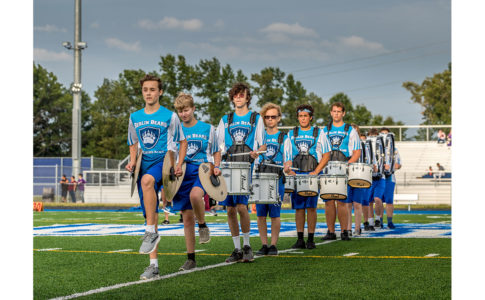You cannot approach a winter guard performance as you would a field show. Time to adjust your process.
Sense Everything
Visualize everything while rehearsing. Make the vision a constant part of your rehearsal process. Understand the close proximity of lighting as it relates to routine responsibilities. Know that the audience is within feet of the competition area and can see every detail you present (for better or for worse).
Hear the music as if it were pulsing through the speakers and bouncing off the gym walls. You may rehearse on blacktop but imagine the slick feeling of the gym floor beneath your feet. Realize it is very easy to get distracted by the audience. Train yourself to focus at all times.
Own It
Know every bit of the routine/staging/performance like it is the back of your saber-tossing hand. Confidence is key in performance, and at an up-close perspective, the audience and judges can tell if you are not confident.
It is your responsibility to not only know the content but own it as well. You are the component that brings the choreographer’s vision to life. Without the performers truly owning, or making it theirs, routines fall flat. The only way to make that happen is to consistently rehearse that way. You need to make an emotional and cognitive commitment. Be prepared to bring this aspect into your rehearsals and performances over and over again.
Perform for the Audience, Not Judges
Do not allow yourself to be intimidated by the judges. Realize that there will be five to six judges (depending on your circuit) in the gym. However, while the judges provide an essential purpose and service in our activity, your primary focus should be performing to the very best of your ability for the audience.
Be aware that judges run a digital commentary throughout every show. Due to the judges’ close proximity, you may overhear some of their dialogue. Do not allow yourself to be distracted. Focus on the fact that you are a performer whose responsibility is to execute a routine with precision and entertain the audience before you.
About the Author
Chris Casteel has been involved in the color guard activity since 1981 as a performer and an instructor. She has a master’s degree in education. She has instructed several medaling guards for the Winter Guard Association of Southern California (WGASC). Currently, Chris is an adjudicator for the Southern California School Band and Orchestra Association and the WGASC as well as a guest adjudicator for many other circuits. She also holds the position of education coordinator for the WGASC.


